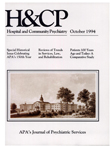Reflections on Antipsychiatry and Stigma in the History of American Psychiatry
Abstract
The author presents his perspectives on the relationship between antipsychiatry and the stigma of mental illness. Stigma has existed at least since biblical times, when madness as demonic possession and punishment for sin became codified in religious belief and practice. The antipsychiatry movement dates from the 18th century, when psychiatry first emerged as a medical specialty and the first mental hospitals were built. Over the years psychiatry has been a target for antipsychiatry groups competing for influence or authority over the mentally ill. At various times these groups have included neurologists, social workers, new religions, consumers, and psychiatrists themselves. Their common ground has been objection to psychiatry as a hospital-centered medical specialty legally authorized to institutionalize and treat patients. in the late 19th century, treatment of hospitalized patients increased the stigma of mental illness and provided fuel for the antipsychiatry movement. During that period psychiatrists began to see heredity as the cause of mental illness, became pessimistic about restoring patients to sanity, and adopted essentially a custodial approach to care that included use of physical restraints. However, recent advances in biological treatments have undercut antipsychiatry and rekindled optimism about recovery that may go far in eliminating stigma.
Access content
To read the fulltext, please use one of the options below to sign in or purchase access.- Personal login
- Institutional Login
- Sign in via OpenAthens
- Register for access
-
Please login/register if you wish to pair your device and check access availability.
Not a subscriber?
PsychiatryOnline subscription options offer access to the DSM-5 library, books, journals, CME, and patient resources. This all-in-one virtual library provides psychiatrists and mental health professionals with key resources for diagnosis, treatment, research, and professional development.
Need more help? PsychiatryOnline Customer Service may be reached by emailing [email protected] or by calling 800-368-5777 (in the U.S.) or 703-907-7322 (outside the U.S.).



